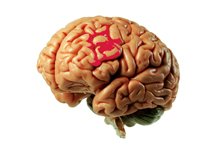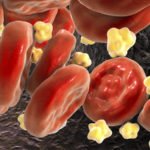It’s utterly amazing how antidepressants remain the most frequently prescribed medications in the US, given the endless list of complaints and side effects triggered by these drugs, not to mention their questionable efficacy. As we’ve reported in the past, antidepressants may cause weight gain, nausea, birth defects, chest pain, insomnia, stomach bleeding, sexual dysfunction, rashes, diarrhea, a decreased ability to experience love, an increased chance of relapse into depression, an increased tendency to violence, and a heightened likelihood of suicide. As if that’s not reason enough to check out alternative cures, a new study indicates that antidepressants may have yet one more particularly ugly side effect. It seems that a popular class of antidepressants called SSRIs, which includes drugs like Zoloft, Paxil, Lexipro, and Prozac, may up the risk of stroke or brain hemorrhage.1 Nordqvist, Christian. “Antidepressant Raises Brain Bleeding Risk.” 18 October 2012. Medical News Today. 31 October 2012. < http://www.medicalnewstoday.com/articles/251651.php>
The news comes from a study involving half a million people out of Western University in Ontario, Canada. The study found that SSRI antidepressants increased the risk of bleeding in or around the brain–triggering a stroke–by up to 50 percent. Here’s the reason. SSRIs work by preventing the brain from reabsorbing a neurotransmitter called serotonin.2 Mayo Clinic Staff. “Selective Serotonin Reuptake Inhibitors (SSRIs).” Mayo Clinic. 31 October 2012. < http://www.mayoclinic.com/health/ssris/MH00066> Instead, the serotonin gets stored between nerve cells. Without serotonin, the theory goes, there’s an easier flow of chemical messages in the brain, and mood supposedly improves (although the experts admit they don’t really understand why). Unfortunately for anyone taking SSRIs, serotonin has multiple functions, one of which is to help blood platelets form clots. When serotonin is limited in the brain, clotting can’t happen, which means excess bleeding may occur.
Though the escalated risk of a stroke or hemorrhage seems alarming, the researchers tell people not to worry. Strokes caused by brain bleeding are actually quite rare. Most strokes get triggered by a blood clot that blocks a blood vessel, not by bleeding, and so the absolute risk of having a brain hemorrhage remains quite low, they say–one in 10,000 (versus one in 20,000 if you don’t take an SSRI). Unless you have a clotting disorder, a previous history of hemorrhage, or if you’re taking blood-thinning medications–the experts insist you shouldn’t fret about it.
“I think that overall, these medications are quite safe,” said study director Dr. Daniel G. Hackam. “Obviously there are [also] risks to having depression go untreated.”
Many of his colleagues agreed, including Dr. Jordan Smoller of the Harvard Medical School, who commented, “We should remember that the conditions people take SSRIs for–depression and anxiety–have their own risks in terms of adverse health outcomes, suffering, disability, and even suicide. So it’s not a matter of risk versus no risk.”3 Jaslow, Ryan. “Popular antidepressants may raise stroke risk.” 18 October 2012. CBS News. 1 November 2012. < http://www.cbsnews.com/8301-204_162-57535201/popular-antidepressants-may-raise-stroke-risk/>
Whether or not you beg to differ, the fact is that any increase in risk doesn’t make sense unless the medication actually does something to alleviate symptoms or to effect a cure. And the big problem with antidepressants is that study after study shows that for most people, there’s little benefit to taking the drugs. As I’ve written before, “According to an article in the New England Journal of Medicine last year, the press on antidepressants hasn’t presented an accurate picture. Of the 74 antidepressant studies submitted to the FDA between 1987 and 2004, only 38 were “positive.” The remaining studies found that antidepressants, in fact, did nothing to relieve depression.4”Antidepressants may not work – report.” CNNMoney.com. 16 Jan 2008. (Accessed 4 Nov 2012.) <http://money.cnn.com/2008/01/16/news/companies/antidepressants/index.htm> Zip. Nada. Ultimately, even the positive studies tended to find that the drugs worked only for the most severely depressed patients.
Add to the picture the fact that numerous studies show that other methods work at least as well as antidepressants in relieving depression, without causing any dangerous side effects whatsoever. In fact, a few days after the study on brain hemorrhaging from antidepressants was published, the National Institute of Mental Health published research revealing that stimulating the frontal lobes of the brain with magnets could relieve symptoms of depression without causing the insomnia so typical of antidepressant medications.5 Nauert, Rick. “Brain stimulation relieves depression with fewer side effects.” 29 October 2012. Psych Central. 31 October 2012. < http://psychcentral.com/news/2012/10/29/brain-stimulation-relieves-depression-with-fewer-side-effects/46802.html> The positive rate of relief from depression using this method, also known as “transcranial magnetic stimulation,” was an average of 58 percent in 42 clinical trials–a better outcome rate than with antidepressant medications.6 Brown-Ayers, Holly. “New research confirms efficacy of trans-cranial stimulation for depression.” 26 July 2012. Eurekalert. 31 November 2012. < http://www.eurekalert.org/pub_releases/2012-07/wih-nrc072612.php> Then again, Jon Barron gave us all a heads up on transcranial magnetic stimulation last year and wrote about the benefits of magnets in treating depression several years prior to that.
We’ve written before about the various nutritional and herbal interventions that work quite well in alleviating depression without raising the risk of stroke, suicide, and the like. We’ve also mentioned studies that found exercise actually outperforms medication in relieving depression. In fact, these studies show that depressed people who exercise without taking medication actually fare better than people who both exercise and take an antidepressant, with lower rates of relapse. Plus, exercisers reap the added health benefits that come along with getting fit. Similarly, studies show that meditating works as well as antidepressants in alleviating depression, as does listening to classical music.
Given the list of alternatives to antidepressants available, we come full circle back to the opening comment about it being utterly amazing that antidepressants continue to dominate the market, with one out of every 10 individuals taking these drugs and annual sales topping 11 billion dollars. How is it possible that so many people still take antidepressants when safe alternatives exist and when studies show negligible benefits, especially for those suffering from mild to moderate depression? Even if the risk is only one in 10,000 for having a brain hemorrhage triggered by an SSRI, the very thought that the drugs work by stopping the clotting mechanism in the brain is reason enough to worry that other unfortunate effects will be uncovered in the future. And is one in 10,000 really that rare an occurrence? Who wouldn’t give anything to have those odds when playing Mega Lotto?
Did you enjoy this information? Get this type of information and more delivered right to your mailbox by subscribing to our free daily health alerts at https://www.jonbarron.org/natural-health/free-daily-health-tips!
References
| ↑1 | Nordqvist, Christian. “Antidepressant Raises Brain Bleeding Risk.” 18 October 2012. Medical News Today. 31 October 2012. < http://www.medicalnewstoday.com/articles/251651.php> |
|---|---|
| ↑2 | Mayo Clinic Staff. “Selective Serotonin Reuptake Inhibitors (SSRIs).” Mayo Clinic. 31 October 2012. < http://www.mayoclinic.com/health/ssris/MH00066> |
| ↑3 | Jaslow, Ryan. “Popular antidepressants may raise stroke risk.” 18 October 2012. CBS News. 1 November 2012. < http://www.cbsnews.com/8301-204_162-57535201/popular-antidepressants-may-raise-stroke-risk/> |
| ↑4 | ”Antidepressants may not work – report.” CNNMoney.com. 16 Jan 2008. (Accessed 4 Nov 2012.) <http://money.cnn.com/2008/01/16/news/companies/antidepressants/index.htm> |
| ↑5 | Nauert, Rick. “Brain stimulation relieves depression with fewer side effects.” 29 October 2012. Psych Central. 31 October 2012. < http://psychcentral.com/news/2012/10/29/brain-stimulation-relieves-depression-with-fewer-side-effects/46802.html> |
| ↑6 | Brown-Ayers, Holly. “New research confirms efficacy of trans-cranial stimulation for depression.” 26 July 2012. Eurekalert. 31 November 2012. < http://www.eurekalert.org/pub_releases/2012-07/wih-nrc072612.php> |











